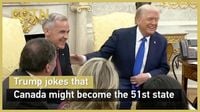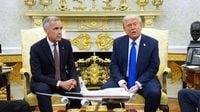On October 7, 2025, the usually staid corridors of the White House buzzed with a rare mix of tension and camaraderie as U.S. President Donald Trump and Canadian Prime Minister Mark Carney met to hash out the future of North America’s most critical trading relationship. The stakes were high: tariffs, trade deals, and even a tongue-in-cheek suggestion that Canada could become the 51st U.S. state all hung in the air.
The meeting, Carney’s second visit to Washington since taking office in March, unfolded against a backdrop of escalating trade disputes and mounting public frustration on both sides of the border. Trump, never one to shy away from controversy, opened with a familiar mix of bluster and warmth. “Trade negotiations are complicated,” he admitted, but confidently predicted that “Canada will be very happy” with any eventual deal, according to BBC News.
For Canadians, the stakes couldn’t be clearer. Their nation remains the only G7 country yet to finalize a trade agreement with the Trump administration in 2025, and the president’s imposition of a sweeping 35% levy on Canadian imports—along with sector-specific tariffs of 50% on metals and 25% on automobiles—has stung. While goods falling under the USMCA (the United States-Mexico-Canada Agreement) are exempt, the tariffs have roiled industries, upended supply chains, and sent political temperatures soaring.
Trump, flanked by Carney in the Oval Office, didn’t mince words about the source of friction. “The problem is that they want a car company, and I want a car company. They want steel, and we want steel... in other countries, they're very far away and there's no problem,” he explained, as reported by BNN Bloomberg. “We don’t like to compete because we sort of hurt each other. It’s a natural business conflict. Nothing wrong with it. I think we’ve come a long way over the last few months.”
Despite the tough talk, the atmosphere was surprisingly cordial. Trump described the U.S.-Canada relationship as one of “natural conflict,” but quickly added, “We also have mutual love. We have great love for each other. I love Canada and the people of Canada.” Carney echoed the sentiment, emphasizing both competition and cooperation: “There are areas where we compete and it’s in those areas we have to come to an agreement that works. But there are more areas where we are stronger together, and that’s what we’re focused on. We’re going to get the right deal.”
This optimism was not universally shared. Canada’s Conservative opposition leader, Pierre Poilievre, warned that anything short of a deal would mean the visit was a failure—an opinion that reflects the anxiety of many Canadians whose livelihoods depend on cross-border trade.
But the real fireworks came when Trump, ever the showman, revived his recurring joke about Canada joining the Union. “The merger of Canada and the United States,” he quipped, sparking laughter in the room. Carney, quick on his feet, responded, “That wasn’t where I was going,” drawing more chuckles from attendees, according to Associated Press. The banter was lighthearted, but the subtext was serious: repeated suggestions that Canada could become the 51st state have infuriated many north of the border, fueling a 23% drop in Canadian visits to the U.S. during the first seven months of 2025 compared to the same period the previous year, as confirmed by Canada’s national statistical office.
“I understand that. Look, I understand that,” Trump said, acknowledging the anger among Canadians. “It’s something that will get worked out. There’s still great love between the two countries but you know American people want product here, they want to make it here. We are competing for the same business. That’s the problem. That’s why I keep mentioning one way to solve that problem. There’s a very easy way.” The “easy way,” of course, was another nod to his statehood jest.
Carney, for his part, was clear: Canada “won’t be for sale... ever.” He had delivered the line in May during a previous Oval Office visit, and it was met with good-natured laughter again this week. Still, the trade war that began in February—ostensibly over border security, according to Trump—has left bruises. Canada retaliated with its own tariffs on U.S. exports, but in August, Carney announced exemptions for goods covered by the USMCA, seeking to ease the pain for both sides.
After the meeting, Dominic LeBlanc, Canada’s minister responsible for U.S. trade, described the talks as “successful” and “positive,” but acknowledged that conversations would continue, especially on the contentious issue of steel and aluminum tariffs. More than three-quarters of Canada’s exports head south, making the U.S. a vital economic partner—and the uncertainty around the USMCA’s future is causing real anxiety in Ottawa and beyond.
Trump, meanwhile, mused about the possibility of renegotiating the USMCA or striking “different deals” that might be better tailored to individual countries. “We could renegotiate it, and that would be good, or we can just do different deals. We’re allowed to do different deals if we want. We might make deals that are better for the individual countries,” he told reporters, per AP.
Despite the apparent warmth between Trump and Carney—a marked contrast to Trump’s famously frosty relationship with former Prime Minister Justin Trudeau—the mood among ordinary Canadians is less sanguine. Frank McKenna, a former Canadian ambassador to the U.S., described the current moment as “the lowest point in relations that I can recall.” He added, “I talk every day to ordinary citizens who are changing their vacation plans, and I talk to large business owners who are moving reward trips away or executive business trips. There is an outright rebellion.”
Yet both leaders seemed eager to project a sense of progress and possibility. Trump praised Carney as a “very strong” leader and a “tough negotiator.” Carney, in turn, called Trump a “transformative president” and highlighted the importance of finding common ground. “We want Canada to do great,” Trump said. “But you know, there’s a point at which we also want the same business.”
As the meeting drew to a close, the two men shared laughs over the merger joke, but the underlying message was clear: the future of U.S.-Canada trade remains uncertain, with high stakes for both economies. For now, the world watches and waits to see whether mutual love—or mutual interest—will win the day.


